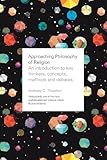Approaching philosophy of religion : an introduction to key thinkers, concepts, methods and debates / Anthony C. Thiselton.
Material type: TextSeries: Approaches in religion and theologyPublisher: London : SPCK, 2017Copyright date: ©2017Description: 1 online resource (256 pages)Content type:
TextSeries: Approaches in religion and theologyPublisher: London : SPCK, 2017Copyright date: ©2017Description: 1 online resource (256 pages)Content type: - 9780281076772
- 0281076774
- 210.1 23
- BL51 .T4275 2017
- online - EBSCO
| Item type | Current library | Call number | URL | Status | Notes | Barcode | |
|---|---|---|---|---|---|---|---|
 eBook
eBook
|
Biblioteca "Angelicum" Pont. Univ. S.Tommaso d'Aquino Nuvola online | online - EBSCO (Browse shelf(Opens below)) | Online access | Not for loan (Accesso limitato) | Accesso per gli utenti autorizzati / Access for authorized users | (ebsco)1791665 |
Includes bibliographical references and indexes.
Preface; Abbreviations; Chronology; Introduction: Landmarks in philosophy of religion; 1 The ancient world; 2 From the medieval to the early modern era; 3 From Hegel to the present day; Part 1; APPROACHES; 1; Analytic philosophy; 2; Continental philosophy; 3; Empiricism and rationalism; 4; Existentialism; 5; Feminist philosophy; 6; Personalism; 7; Phenomenology; 8; Pragmatism; Part 2; CONCEPTS AND ISSUES; Animals; Cosmological argument; Design argument; Divine action; Evolution; Faith; Free will; Gender; God, attributes of; God, existence of; Good and evil; Humanity; Life after death.
MiraclesMorality; Ontological argument; Religious experience; Religious knowledge; Religious language; Revelation; Part 3; KEY TERMS; Select bibliography; Search names for authors; Search items for subjects; Notes.
Online resource; title from PDF title page (ProQuest, viewed April 27, 2018).
The book opens with an engaging history of the subject, mapping the major landmarks and outlining the main issues of current debate. The rest of the book falls into three parts: Part 1: Approaches. Descriptions of the main approaches developed by scholars to study the subject, with lively case histories and working examples showing the approaches in action, and assessing their lasting value. Part 2: Concepts and Issues. Brief introductions to their origins and evolution, highlighting their significance in the work of major thinkers. Part 3 Key Terms. Concise explanations of all the words and phrases that readers need to know in order to fully grasp the subject.


